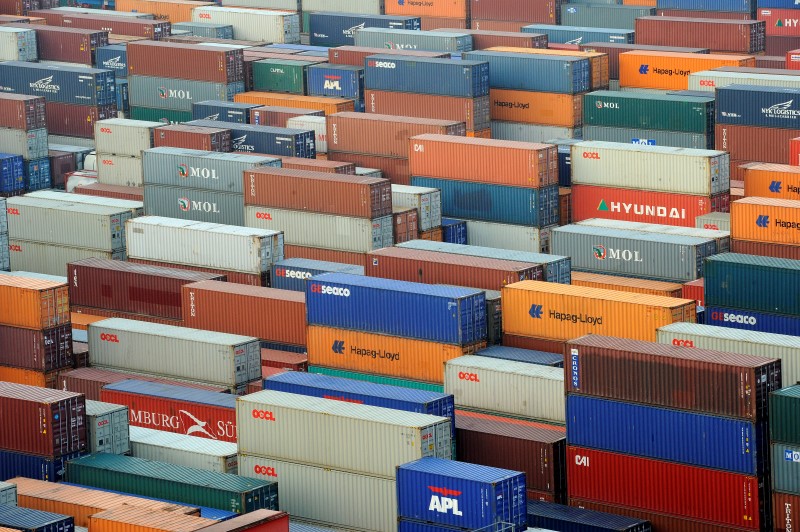By Michael Nienaber
BERLIN (Reuters) - German imports unexpectedly fell in April while exports were unchanged, propelling the trade surplus of Europe's biggest economy to a fresh monthly record despite weaker demand from emerging markets such as China.
The overall solid trade data, published by the Federal Statistics Office on Thursday, are likely to stir up a debate about how Germany's relatively strong exports are continuing to fuel global economic imbalances.
The International Monetary Fund (IMF) and the Organisation for Economic Cooperation and Development (OECD) have for years urged Germany to step up public and private investment in infrastructure to reduce its current account surplus.
Close allies such as France and the United States have also called for Germany to boost domestic demand, and Berlin has reacted to this by increasing its spending on infrastructure and accommodating and integrating a record influx of refugees.
Analysts said the data suggested that Germany's economic growth pace would slow in the second quarter, pointing out that the trade surplus widened in April because of weaker imports.
"The times of Germany's export boom are over for the time being," VP bank analyst Thomas Gitzel said, adding weaker global demand was the main reason behind the subdued trade prospects.
"Important trading partners such as China, Russia and Brazil haven't overcome their crisis yet," DIHK economist Volker Treier said, adding that trade with the Unites States - Germany's most important trading partner - also slowed due to a stronger euro.
The data showed that seasonally adjusted imports edged down 0.2 percent in April on the month while exports were unchanged after rising two consecutive months.
Economists polled by Reuters had expected exports to fall by 0.6 percent and imports to rise by 1.2 percent.
The fall in imports widened the seasonally adjusted trade surplus to 24.0 billion euros from revised 23.7 billion euros in March which had been the highest monthly value so far.
A breakdown of non-adjusted trade data showed exports to European Union countries soared while demand from countries outside the bloc edged down.
ING bank economist Carsten Brzeski said the trade data were evidence that the German economy was struggling to gain further momentum after its surprisingly strong start to the year.
The German economy grew by 0.7 percent in the first quarter, its strongest quarterly growth rate in two years, helped by higher private consumption and construction investment. But economists expect the pace to slow in the second quarter.
Data released earlier this week showed industrial output rose slightly more than expected in April while weaker foreign demand drove a bigger-than-expected drop in industrial orders.
